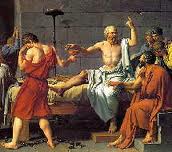 I hate it when I have an idea and I don't write it down. Somehow, I had connected both pieces that we had discussed today in a really cool way, but I lost it. It went right out of my head somewhere on the journey to take my youngest daughter to the pool. My kids tend to converse about stuff irrelevant to early western literature, and they fill my head full of middle school drama. I could care less, but it does tend to push my important thoughts into a dust covered box in the back of my brain in which great shit disappears and never sees the light of day again. Without kids I could have been some great scholar or the next Einstein. Like the death of Socrates, it's all sad, but true.
I hate it when I have an idea and I don't write it down. Somehow, I had connected both pieces that we had discussed today in a really cool way, but I lost it. It went right out of my head somewhere on the journey to take my youngest daughter to the pool. My kids tend to converse about stuff irrelevant to early western literature, and they fill my head full of middle school drama. I could care less, but it does tend to push my important thoughts into a dust covered box in the back of my brain in which great shit disappears and never sees the light of day again. Without kids I could have been some great scholar or the next Einstein. Like the death of Socrates, it's all sad, but true.I do remember the first part of my premise, so I'll write. Maybe the rest of it will surface eventually, or maybe I'll think of something better. Here are some random ramblings.
Speaking to Meletus, Socrates says, "You know bad people do something bad to [whoever's] closest to them at the given moment, and good people something good?" (766). I believe that Socrates is saying that people don't intentionally do evil things to one another. If a person doesn't know he's doing something wrong, then how can he be blamed for the fault? So, it's that simple. Ignorance is bliss, and all is right with the world.
However, two other assumptions need to be considered. There are many believers whose idea of evil stems from the biblical meaning of sin. There is a right and a wrong, and anyone with intelligence knows the difference. He chooses his own actions. And then there's justification: (an eye for an eye (Mattew 5:38)) a person commits a wrong and is legitimized in performing it.
In regarding the Bible, I went looking for an ally for Socrates in Aristotle. In Poetics, Aristotle defines the Tragedy, but using his definition of Character we help Socrates make his case."Character is that in virtue of which we say that the personages are of such and such a quality; and Thought is present in everything in their utterances that aims to prove a point or the expresses an opinion" (780). In class today, we discussed further on Aristotle's clarification of character. A weak character caves easily under pressure. This pressure can be anything to drive a character to do something he or she wouldn't normally do. A Strong character holds out till the bitter end. His suffering progresses up a figurative mountain to a precipice. To escape he gives in and jumps off; either he commits a crime, or he willingly receives any consequences (i.e. death) for not performing the crime. The Bible implies that we all have a choice. We choose between right and wrong. Aristotle suggests that a weak character has no choice, and if I understand correctly, a strong character still has a choice, which brings morality into the argument.
What Socrates says, is without instruction, then one cannot realize his fault. If we relate this reasoning to the Bible, then a person who has not read the Bible cannot be accountable for his actions. Yet, there is the whole social/moral code in which we all experience and learn while growing up and integrating into society. That accounts for something, even if one hasn't read the Bible.
So... we're all strong characters... The End.

No comments:
Post a Comment